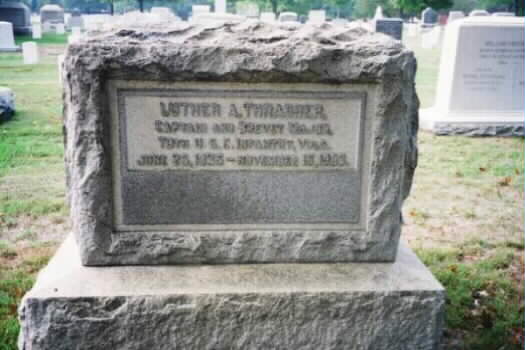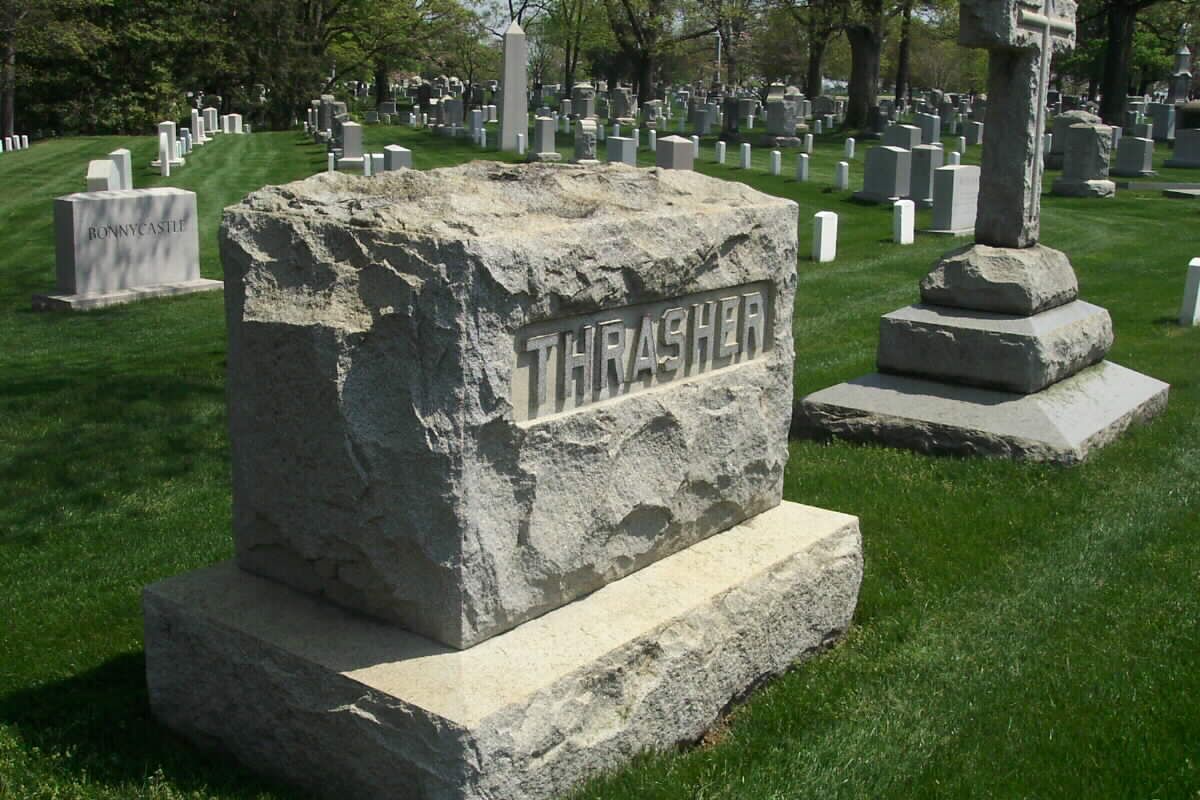Thanks to Howard Mann of Kansas and Keith Barnes of Washington, D.C. for providing the following information:
Mr. Thrasher migrated to Kansas in the turbulent 1850’s and joined Colonel James Montgomery’s Third Kansas regiment, part of Lane’s Brigade. He left an unpublished diary for November 1861 – February 1862 in his company’s letter book.
He was promoted to Lieutenant of his company and transferred to the Second Kansas Colored Regiment in 1863.
Rising to the position of Brigade Quartermaster of the Army of the Frontier, Thrasher completed his service during the Civil War.
He returned to action, and his diary entries, while serving as quartermaster of the Nineteenth Kansas Infantry during the Washita campaign.
Returning to teach in a subscription school in Iola, Captain Thrasher apparently couldn’t stand the quiet life. He became an employee of the U.S. Treasury department as a revenue agent. He commanded other agents in conflict with illegal whisky manufacturers and developed a reputation for bravery in West Virginia and in the Shenandoah Valley. Mr. Thrasher reported some of his adventures in a local Iola, Kansas newspaper.
He died suddenly while on duty in Lynchburg, Virginia in 1903 and was interred in the National Cemetery in Arlington.
Luther A. Thrasher Captain, 79th USC Infantry Volunteers Born 26 June 1835 (on headstone only) Died 15 November 1903. He is buried in Section 3, Grave Number 1400, Arlington National Cemetery.
Also, he has a son buried with him, same grave, Luther E. Thrasher, who died 27 August 1901, in San Francisco, California (according to published reports he commited suicide). I went to see the grave. There is no additional inscription showing his son is there. There is a HUGE private monument for Luther A. Thrasher. Apparently the family never had the name put on, as there is no reference to the son being there, although he IS listed in the records of Arlington National Cemetery. Luther A. Thrasher was cremated.
NOTE: Hi Michael: Obtaining authoritative information on the death of Luther E. Thrasher is not easy because all San Francisco City and County records were burned in the fire of 1906. However, I have received a photocopy of the ledger of the San Francisco IOOF Crematory. It still exists, is in excellent condition, and is totally readable. ?It appears that Luther Thrasher probably did commit suicide. Let me cite the relevant entries. Date of Death: Aug 27, 1901; Place of Death: 1206 Market St. [San Francisco]; Name of Coroner: T. B. W. Leland;
Cause of Death: “Gunshot wound of brain”; Funeral Director: Pacific Unt’g Co.;Remains Incinerated: Sept 4, 1901. The ashes were sent to Mrs. L. A. Thrasher. ?Her receipt dated September 10, 1901 is pasted into the ledger. The fact that the pre-printed word “Physician” was crossed out and replaced by the handwritten word “Coroner” seems very significant. This was not a natural death. I do not have any evidence that the ashes eventually found their way to Arlington National Cemetery, although I do not doubt it. James Moule, June 2008.
THRASHER, LUTHER S/O L A
- DATE OF DEATH: 08/27/1901
- DATE OF INTERMENT: Unknown
- BURIED AT: SITE 1400
- ARLINGTON NATIONAL CEMETERY
- SON OF LA THRASHER – CAPT 79 USC INF
THRASHER, LUTHER A
- CAPT BVT MJR US INF
- VETERAN SERVICE DATES: Unknown
- DATE OF DEATH: 11/15/1903
- DATE OF INTERMENT: Unknown
- BURIED AT: SITE 1400
- ARLINGTON NATIONAL CEMETERY
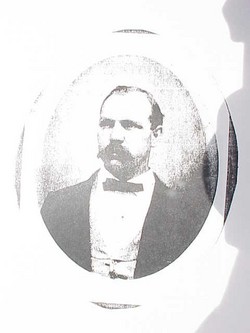
A heartfelt thanks to Howard G. Mann for sharing the following materials from the Kansas State Historical Society with me. They are posted here in memory of Captain Thrasher, a true American hero nearly lost to history.
In Memory Of Luther A. Thrasher
1835-1903 This brief booklet, with sketches of the life And tributes to the memory of Captain A. L. Thrasher, has been compiled and printed with the thought that relatives and intimate friends would be glad to have in permanent form a reminder of the character and a record of the services of the man whomm they loved and honored.
- Amanda McClure Thrasher
- Iola, Kansas
June 1, 1916
LUTHER A. THRASHER Luther A. Thrasher was born in Loudoun County, Virginia, June 26, 1835, and died in Lynchburg, Virginia, November 15, 1903. At the age of ten years he moved with his parents to Belmont County, Ohio. He received his early education in the Academy at Barnsville, Ohio.
He removed to Champaign County, Illinois, in 1853, where he engaged in farming and teaching. He taught in Sidney, Illinois, until March 1859, when he came to Allen County, Kansas.
He was among the first to teach a subscription school in Iola and was also principal of the Iola School in 1869 and 1870.
He married Amanda L. McClure near Carlyle, Kansas, on November 10, 1870. He had two children, Luther E. and Sara Emily. The mother and daughter survive him.
At the breaking out of the Civil War he enlisted on the 28th day of August 1861, as private in the 10th Regiment of Kansas volunteers in a company commanded by the late Captain W. C. Jones.
When the policy of utilizing colored men as troops on the Union side was approved he recruited a company and was made Captain of Company EW, in a regiment known as the First Kansas Colored Volunteers, under the command of Colonel J. M. Williams, which afterward became distinguished as the 79th U.S. Colored Troops. On account of his executive ability he was soon assigned to duty as quartermaster of the 2nd Brigade of the frontier division, 7th Army Corps, which position he filled faithfully until the close of the war.
On the 13th of March 1865, the rank of Major by brevet was conferred upon him “for gallant and meritorious services during the war.” He was not discharged from the service until October 1, 1865.
During the Indian troubles in Kansas and northwest in 1868-69, the governor of Kansas, S. J. Crawford, appointed and commissioned him first lieutenant and regimental quartermaster of the 19th Regiment of Kansas volunteer cavalry.
He was in government employ almost ever since the close of the Civil War, carrying through two important government surveys in peril from Indians to himself and party.
He surveyed and plotted towns on the Santa Fe Railroad and much of his best energy was bestowed upon the building of Florence and Larned.
He had been in government employ as revenue agent for twenty years, being on duty in Lynchburg, Virginia, at the time of his death.
In 1882 he became a member of George H. Thomas Post Number Two, G.A.R. (Grand Army of the Republic), of San Francisco, California, but was a member of McCook Post Number Fifty-One at the time of his death.
The funeral services were conducted at the chapel of the crematory in Washington, by G.A.R. Chaplain Stevens, and attended by a number of old friends from Kansas, sojourning in Washington, besides a representation of friends from the war and revenue departments.
The casket was draped with a tattered flag kindly contributed by his old commander, General J. M. Williams. This battle flag was presented to the 1st Kansas Colored Volunteers by the citizens of Massachusetts and borne in triumph by this regiment through the war of rebellion.
His inurned ashes were placed in a tomb at Arlington National Cemetery, a suitable honor which our country pays her noble dead. He was given a soldier burial, a detail of soldiers from Fort Myer firing the parting volley over his grave, a bugler sounded “lights out,” leaving an honored name.
Death Of Mr. L. A. ThrasherWell-known former citizen of Iola died yesterday
Down in Lynchburg, Virginia
From the Iola Daily Register, Monday, November 16, 1903
A telegram came this morning from Lynchburg, Virginia, telling of the death there yesterday evening of Captain Luther A. Thrasher. The message was signed by Mrs. Thrasher and came to Mr. W. H. McClure of this city.
Captain Thrasher and his family were for many years residents of Iola and still own residence properly there they formerly lived, at the corner of Neosho and Washington Avenue. Mr. Thrasher had been engaged for twenty or thirty years in the internal revenue service, continuously save during the short period when Grover Cleveland was president. He was a captain in the Union Army during the war of the rebellion and his iron will and absolute fearlessness made him one of the best men in the revenue service. Many daring raids of illicit still he made in the southern mountains and he has had charge of work in many parts of the country, residing at different times in San Francisco, Washington, St. Louis, Chicago and Philadelphia. A blow which was really the beginning of the end came to the old soldier a few years ago when his only son died a very sad death in San Francisco. When the grief-stricken father came to Iola and met the old friends of earlier days and the young men who were boyhood chums of his boy, lines of suffering were written on his face which indicated that the blow was too deep for even his iron constitution. The immediate cause of his death was pleuro-pneumonia, but aside from this fact and the additional statement that the remains would probably be buried in the beautiful Arlington Cemetery at Washington, the telegram told nothing.
Mrs. Thrasher and Miss Sara Thrasher, the only surviving child, are left of the family, and it is not know whether they have ever considered the idea of coming back to Iola to live. Mrs. Thrasher is a sister of W. H. McClure and Mr. W. J. McClure of this city.
The sorrowful sympathy of all the friends of “auld lang syne” will be extended to the wife and daughter, who have lost a tender husband and father.
Stories of Captain Thrasher’s LifeFrom the Daily Register, Tuesday, November 17, 1903
The death of Captain L. A. Thrasher has caused old timers to relate some of the many incidents which occurred in his somewhat adventurous career as a soldier, frontier surveyor and revenue officer.
Captain Thrasher made one of the last government surveys made in Kansas. During this survey his force was divided into two parties. The one under Captain Thrasher came out alive but the other one under Captain Short, of Lawrence, was massacred to a man. Failing to meet at the appointed time and place, Captain Thrasher and his men started in search of the missing ones and found the scalped and mutilated corpses. There had been a running fight for miles and then, with their animals killed, the little squad of seven or eight men, some of whom were mere boys from the State University, made the best fight possible. Captain Thrasher finished the survey under military escort.
His revenue service for years was of a particularly dangerous kind and he had many desperate encounters with moonshiners and was instrumental breaking up many bad bands. Though a man of iron nerve and strong determination, he was ever averse to any undue harshness and always sought to attain his ends without force if possible. It is related that once when leading an expedition into the mountains against a particularly desperate and strong gang of moonshiners that he repeatedly cautioned his men to restrain themselves and try and effect the capture without hurting anyone. When they reached the still and his men separated to surround the place, his last word was to caution them against rashness and to repeat his instructions about not hurting anyone. The moonshiners, however, were not hampered by any such humane feelings and, as it proved, were waiting the advance, and opened fire on the officers. At the first volley, a shot struck a young officer particularly dear to Captain Thrasher. The young man sprang from his crouching posture, cried to the Captain that he was killed and fell dead. With the fall of his young friend the captain caught the spirit of the fight and called to his men to charge and he advanced on the run, his revolver blazing and his men closing in on the mountaineers from all sides. Then followed a desperate hand to hand fight that was one of the deadliest in the history of the revenue service.
At one time the Captain undertook the capture of an old man who for years had evaded arrest and had been a life-long leader in the moonshine country. The Captain surprised his man and placed him under arrest and started out of the mountains with him. This was by far the most dangerous part of the job. As the two rode down the mountain trail, three horsemen appeared a little distance ahead of them. The old man turned to the Captain and remarked, “Officer, you had better prepare to die. Yonder are my two sons and a nephew. They mean to kill you.”
Thrasher coolly replied that they would probably do so, but added that he did not intend to die alone. When he arrived near enough to the men for them to be dangerous, he quietly drew his revolver and placing it to the old man’s side shouted to the young to turn and ride down the road. Realizing the kind of man that they had to deal with they lost no time in obeying and the five continued down the trail in this manner until near the place of rendezvous which the Captain had appointed with his men. Seeing they were being forced into a trap the young men turned aside and disappeared.
A dozen stories could be written of his daring and nerve. Though for a number of years he had been in Iola but seldom he still retained the affections of his old-time friends and many of the people here were grieved to learn of his death.
Tribute From His Old Commander I take great pleasure in sending a statement of the services of the late Captain and Brevet Major Luther A. Thrasher, while on duty with and under my command.
Captain Thrasher joined my command January 13, 1863, with a company of recruits and was mustered into the United States service as Captain of Company E of the 1st Kansas Colored Volunteers on March 9, 1863. He served with that regiment until about August 1, 1863, when by reason of his well known executive capabilities he was relieved from his position as company commander and placed on duty as the quartermaster of the 2nd Brigade of the Frontier Division, 7th Army Corps.
The `1st day of May 1864, I took command of the brigade, found him brigade quartermaster and he remained on duty during the time that I had command of same.
Captain Thrasher as company commander and brigade quartermaster exhibited great executive ability, which with his well-known energy, honesty and patriotism, proved him to he one of the best and most efficient of the officers on duty in the field and in camp and his services were of great value to the government of the United States.
Now that he has been called from duty in this world, his companions in arms cannot but believe that in entering the world to come he will fully receive a reward that his honesty, patriotic bravery, energy and capacity so fully demand and calls for.
Very truly,
J. M. Williams
Captain and Brevet Major, U.S. Army Retired
Lieutenant Colonel and Brevet Brigadier General of Volunteers
Tribute From Charles F. Scott
From the Iola Daily Register, Friday, November 27, 1903
The register has already reported the lamented death of Captain L. A. Thrasher. In company with Mr. Calderhead, Mr. Bowersock and Mr. Miller, I attended the funeral which was held in the little chapel attached to the rooms of one of the undertakers on Pennsylvania Avenue. The casket was draped with the battle flag of the old 1st Kansas Regiment, the Colonel of which, now General Williams, was a devoted friend of Captain Thrasher. A brief service was read by the Chaplain of the Grand Army of the Republic Post, after which the family and friends retired, and the remains were incinerated. The next morning at ten o’clock the ashes of Captain Thrasher, together with those of his son, Luther, were taken to Arlington, that splendid and beautiful “acre of God” in which are interred Sheridan and Logan and Lawton, and thousands of the officers and men who served under them or in the same great cause, and there committed to the tomb, a detail of soldiers firing the parting volleys over the new-made grave and a bugler sounded the mournful noted of “lights out.”
And so a brave man who was a soldier all his life, for all his life he was fighting some good battle, has lain down among thousands of those who were his comrades in the old days, in sight of the Capitol which for four years they offered their lives to guard, in soil that forever and ever will be consecrated and held sacred by the country they served. I knew him well. I can hardly remember when I did not know him. Among my earliest recollections is the feeling of terror which struck to my childish heart when I heard that he and my father, then engaged in some government work on the plains, had been captured by Indians. I do not remember the story in much detail now. I only recall the impression that there were two brave men. Stories have already appeared in the Register, illustrating Captain Thrasher’s coolness and courage in times of danger. Other stories might be told which would illustrate equally his loyalty to his friends, his devotion to his family, his fidelity to every good cause. His death was due remotely to Bright’s Disease, directly to acute pneumonia. At least that is what the doctors say. His friends know that his fatal illness dated in reality from the moment when the news came of the death of his only son in San Francisco. That blow went straight to the heart and he never recovered from it. Those who knew him casually thought him hard and cold and stern. He is dead years before his time because he was not any of these. Undemonstrative to the verge of reticence, he perhaps never showed even under his own roof the absorbing affection which he felt toward his son, but when that brief life ended the light of his own life went out. Side by side now, is the same narrow grave, the ashes of both repose, and that is as both would have had it.
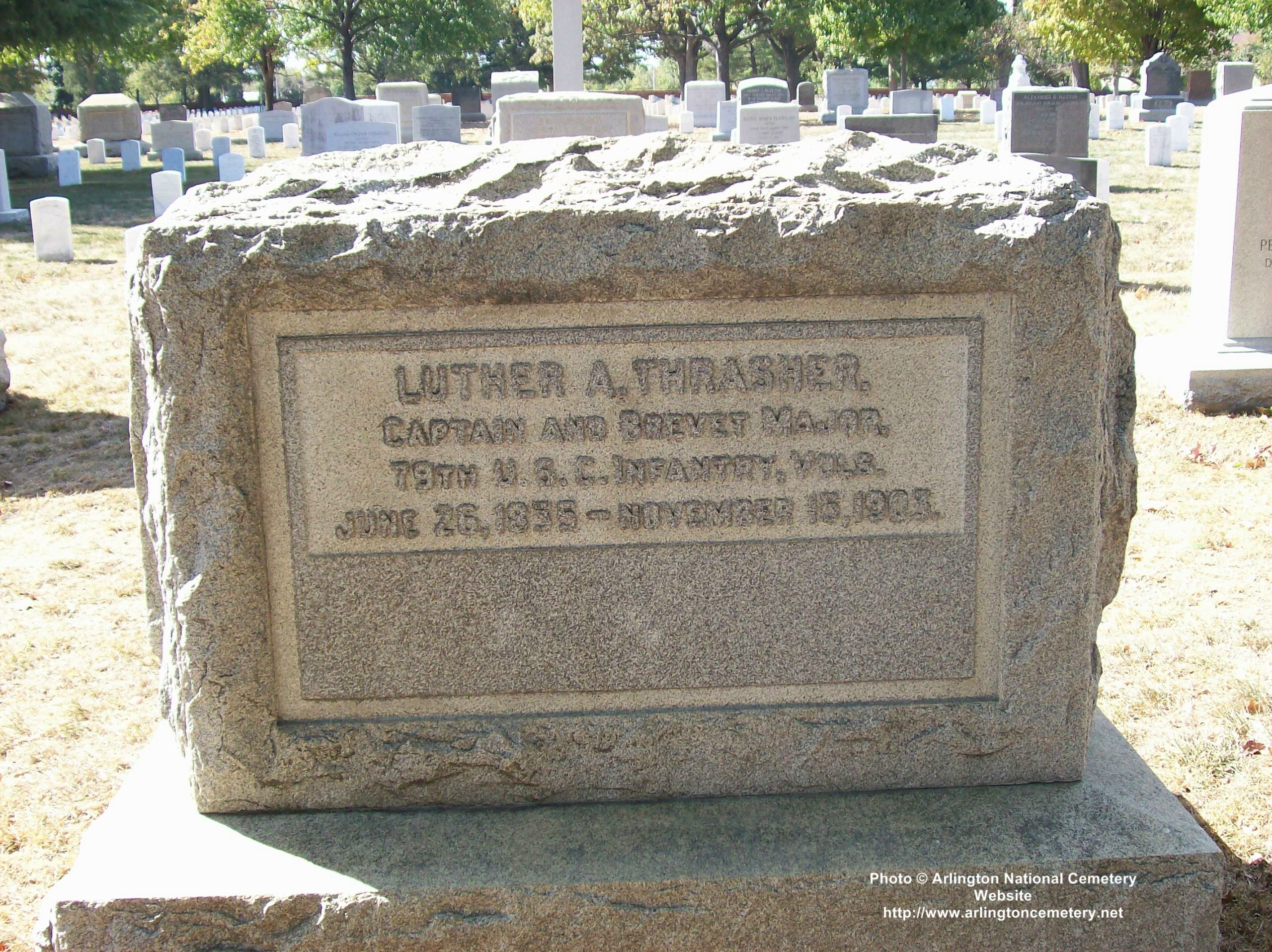
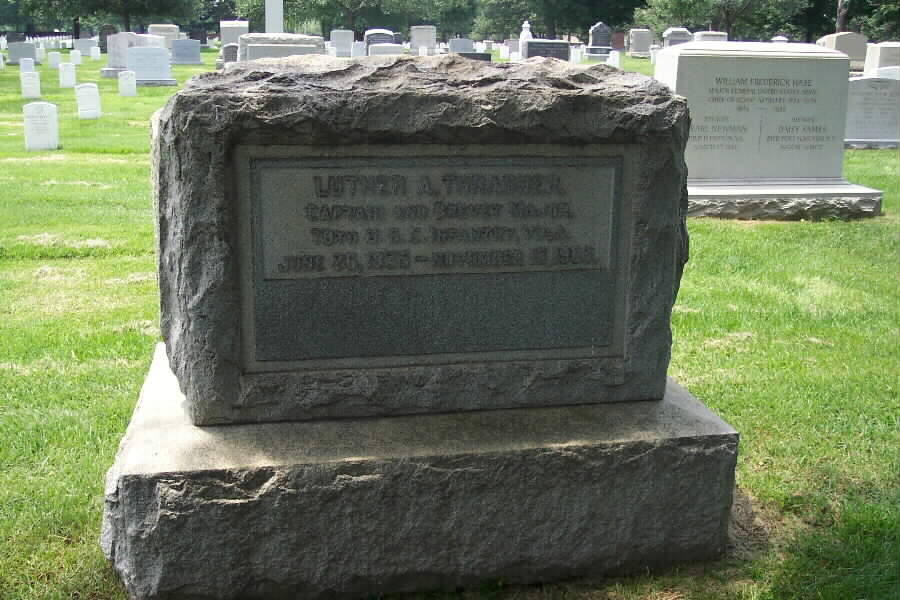
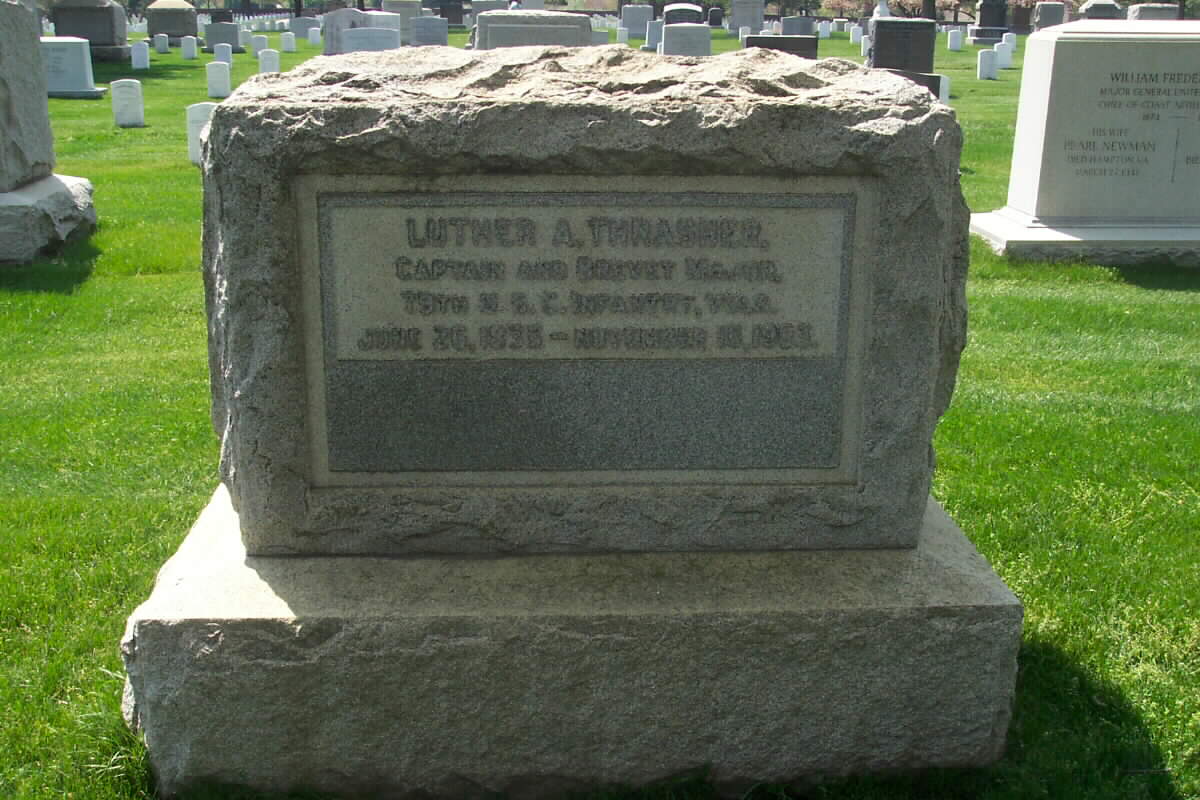
Michael Robert Patterson was born in Arlington and is the son of a former officer of the US Army. So it was no wonder that sooner or later his interests drew him to American history and especially to American military history. Many of his articles can be found on renowned portals like the New York Times, Washingtonpost or Wikipedia.
Reviewed by: Michael Howard

